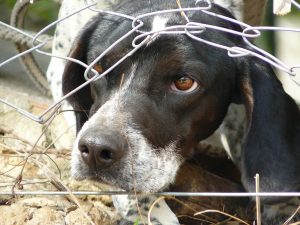
One ordinary day last week, Irfan Khan heard barking dogs that sounded quite out of ordinary for him. He followed the sound and reached an open area in Chandragiri-9. What he saw baffled him there. Many dogs were being kept in cages and makeshift sheds. Moreover, those dogs were not local “stray” dogs that were captured and then taken care of; they were pedigree dogs or “breed dogs” being held for commercial breeding purposes.
Khan videographed the scene and the video has attracted the netizens with them reacting to the cruelty imposed on the dogs. But, stakeholders want to underline this is not the first time that the commercialisation of pedigree dogs has been a problem.
The love for pedigree dogs
There are around 100,000 street dogs in Nepal and they all face problems with food, protection and shelter let alone respect. Many get abused and beaten by people and crushed by vehicles.
“Yes, there are many other local dogs, but the people are inclined towards owning the foreign breed of dogs or pedigree dogs. Local dogs have gained minimal attention,” says Radha Gurung, the communication officer at Animal Nepal.
Manumitra programme coordinator Sangita Sapkota complains that foreign breeds of dogs are being bought whereas adoption of locals is not encouraged. “Pedigree dogs are being brought without any standard or law, without ethics and a second thought about how they impact the dogs here.”

According to Shristi Shrestha, a dog lover and an activist, “Pedigree dogs have become a sign of social status, people are buying them paying even Rs 70,000 to 100,000 and getting them from abroad. The love for these foreign breeds started just some five years ago.”
The increasing demand for dogs has increased the number of kennel clubs and pet shops in Kathmandu whereas the love for pedigree dogs has also given rise to people breeding dogs in their backyard, their homes, say the stakeholders. And such breeders have taken it online, using various social media sites to sell puppies and earn some extra money.
Time to think about consequences
Breeding pedigree dogs is not a problem in itself. But, Shrestha says, “Owners are running after the fashion and are rearing Siberian huskies, Saint Bernard and Tibetan mastiff in the hot and humid climate of places like Kathmandu and Terai, where there are not suitable climate conditions. Are owners considering the factors?”

“People who are buying dogs are surely dog lovers. But, now they need to be more aware. Know about the dogs, their living conditions, genetic conditions, where they were bred and the cruelty of the breeding industries,” she stresses.
While dogs should reproduce naturally, the increasing demand for pedigree dogs has encouraged people to force breeding. This includes inbreeding (among immediate siblings) and cross-breeding (among two different breeds). “Inbreeding causes many problems in dogs, but people are not bothered about it when they buy dogs,” says Shrestha.
The foreign dogs are being inbred and crossbred for more options, for more money. In some slum areas, even the local dogs are being crossbred with the (abandoned) purebred dogs too. Because of this, all variations of the dogs are seeing many problems.
“Pedigree dogs today have at least one kind of disease since birth and in the end, they are abandoned. This can cause emotional and financial burdens. People should realise unethical breeders are ripping off the buyers and dog lovers,” explains Shrestha.
The dogs are adopted when they are small and abandoned in their old age. It happens when the owners are not aware in the first place, which leads them to abandon the dogs when they are sick or get old. “It is the human tendency to go for something and want something that is cute and beautiful. It is natural. But, now, we have to think about what its impact is on a bigger scale and be responsible for the choices we make,” adds Gurung.
Aatmoutsarga President Pratibha Gurung says her campaign has rescued and treated many purebred dogs that have been abandoned for the same reasons.

The next way is legal
There is another serious problem with the breeding of pedigree dogs, according to Shrestha.
“There is no mention of a breeding licence in the Nepali law. Because of that, we cannot even call them illegal, but it is negatively impacting the dogs,” explains Shrestha.
But, Pratibha Gurung adds there is a law [Criminal Code, 2017, Chapter 27, Section 290] under which people are now being penalised for animal cruelty. She thinks the breeding industry could be covered by the law, but there is a gap in understanding among the lawyers and security personnel too.
But, Radha Gurung says, “We need a separate Animal Welfare Act too that incorporates all the nitty-gritty of the sector. Then, at an individual level, people need to be more informed about their social and human rights and responsibilities as well as take the lead and file cases against those who are abusing dogs or any animal.”
Other than that, pet shops and non-licensed breeding centres need to be controlled for their rampant and unethical practices, she adds. “According to our report, 76.7 per cent of the surveyed breeders and 69.7 per cent of the surveyed sellers did not have a licence to sell live animals while 33.3 per cent of breeders and 9.09 per cent of sellers were not even registered as a business.”
Shrestha says many breeders of pedigree dogs have admitted to keeping the dogs strictly in the cages and also admitted to not cleaning the cages for days. “So, the situation is very dire.”
Sapkota hence suggests, “We have to push authorities for the microchipping of the dogs too. Kathmandu metropolitan city already has acknowledged it and has set the budget too. So now we have to make sure that it is implemented.”
She is hopeful that if that happens, a lot of the abuses and abandonment issues will be solved. “Abuse against dogs has always been illegal, but the problem is that the law does not know who to hold responsible. If the dogs are registered and then microchipped, the dogs at residences will not be abandoned and if abandoned, the people abandoning will be penalised.”
Sapkota also suggests, “At airports, the airport authority and airlines need to be more vigilant while the security forces need to be even more vigilant as pedigree dogs are imported and exported more from land. The collection of data from these checkpoints will give us a better idea of the situation, which as of now is insignificant and erratic.”

What else to do?
To solve the problem of haphazard breeding of pedigree dogs, Shrestha suggests people should be mindful when posting photos of their cute dogs. “When celebrities post their exotic, expensive dogs, it is natural to want the dog for yourself too. But, people need to be mindful and not be obsessed. Just for your desire, a living being should not suffer.”
Other than that, the people can push the local authorities to make a working committee to manage the dogs better. For example, Kathmandu needs a dedicated workforce available 24×7 with the skills and technical knowledge for clinical response and regular monitoring.
The most effective way to stop the breeding of pedigree dogs is to decrease the number of buyers. When getting a dog, people need to ask for the history (pedigree) and a health certificate, then sign up only when they are okay with taking care of the dog for a lifetime, suggest activists.
People should also understand that other animals like rabbits, hamsters, and cats are also being victims of the same trend to a certain extent, adds Radha Gurung.
Meanwhile, the activists are looking forward to convincing the Agriculture and Livestock Department to think about animal welfare and booming industry that is not legal. “We also want to highlight that the breeders are evading so many taxes, and, with that angle, we hope to draw the government’s attention,” informs Radha Gurung.





















